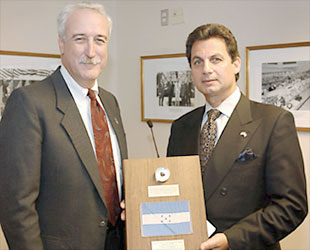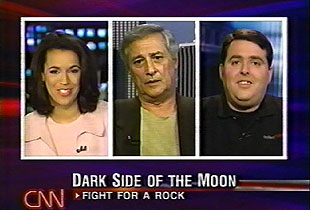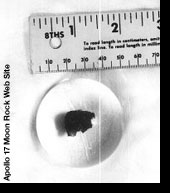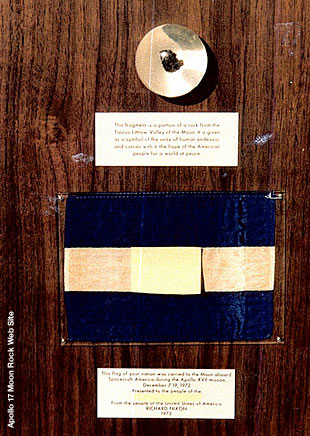 advertisements advertisements
|

|
Full coverage: Honduran moon rock on trial
Article index:
Moon rock returns to Honduras
February 28, 2004 — NASA Administrator Sean O'Keefe and astronaut Carlos Noriega attended today a ceremony in Honduras to present President Ricardo Maduro with a small moon rock that had been stolen from his country in 1995, reports the Associated Press.
"Thank you for returning this material that is so valuable to the world," said Maduro during the ceremony.
The rock will be placed on display in Tegucigalpa at the educational center Centro Interactivo Chiminike.

NASA Administrator Sean O'Keefe (left) formally returned a plaque containing a moon rock to Honduran ambassador Mario Canahuati (right). (Bill Ingalls) |
NASA returns moon rock to Honduras
September 22, 2003 — In a ceremony held today at NASA Headquarters in Washington, DC, NASA Administrator Sean O'Keefe formally returned a fragment of the Apollo 17 "Goodwill Rock" to the people of Honduras.
Accepting the lucite-encased lunar sample on behalf of his country was Ambassador Mario M. Canahuati.
Also present at the ceremony were two of undercover agents who conducted the case to recover the missing moon rock, U.S. Postal Inspector Bob Cregger and former NASA Senior Special Agent Joseph R. Gutheinz, Jr. (who also contributes articles to collectSPACE).
The five year old case began as an undercover sting operation referred to as "Operation Lunar Eclipse". Gutheinz, alias "Tony Coriasso", and Cregger, alias "John Marta", created a fictitious front company known as John's Estate Sales, with a dedicated phone line. Together they placed a newspaper advertisement with a picture of a jumping astronaut on the Moon, and a caption which read "Moon Rocks Wanted".
Soon thereafter, Miami businessman Alan Rosen made contact with what proved to be a real moon rock. Gutheinz and Cregger flew from Houston to Miami to meet with Rosen, and after two months of negotiations Rosen agreed to show the moon rock to what he believed was a neutral third party (a bank officer). Rosen picked the bank and Gutheinz picked the officer, an undercover customs agent with a seizure warrant waiting.
"Findings of Fact/Conclusions of Law"
March 28, 2003 — Presented in its entirely in PDF format: "Findings of Fact and Conclusions of Law" for "United States of America vs. One Lucite Ball Containing Lunar Material (One Moon Rock) and One Ten Inch by Fourteen Inch Wooden Plaque" as ordered by US District Judge Adelberto Jordan on March 24.
Court rules moon rock should be forfeited
March 25, 2003 — A U.S. District Court in Miami, Florida has ruled that Alan Rosen's Honduran moon rock should be forfeited. The verdict, which was handed down yesterday by Judge Adalberto Jordan, leaves the fate of the lunar sample to be decided by the U.S. government.
"That sounds good," said Assistant U.S. Attorney James Swain in an interview with the Associated Press.
Prior to the ruling, Rosen suggested selling the rock and splitting the proceeds. Judge Jordan replied in his verdict, "The United States has not agreed to an equitable division and indeed vehemently opposes it."
Honduras has asked for the rock to be returned.
Honduran moon rock trial begins
March 4, 2003 — The trial of a lucite-encased moon rock allegedly smuggled into the U.S. from Honduras began yesterday, according to a report filed by the Associated Press. After just two hours of testimony, U.S. District Judge Adalberto Jordan promised to rule in two to three weeks as to whether the rock was stolen.
Alan Rosen, the Florida businessmen who claimed the Apollo 17 lunar sample as his after allegedly purchasing it from a retired Honduran colonel, was the trial's only witness. In addition to recounting his story (see earlier updates below), Rosen offered a contract in Spanish as proof of his legal claim.
Rosen believes the rock is worth $5 million, based on a report that a similar gift to Nicaragua sold for as much as $10 million. If the judge awards the lucite-encased sample, Rosen's rock could be the first Apollo recovered lunar specimen to be brokered on the U.S. market.
Rosen: no law prohibits possession
July 24, 2002 — Gregory Lewis, writing for the Sun-Sentinel, interviewed Rosen and collectSPACE member Bill Ayrey to file an update. From his article we learn:
Rosen believes "his" case is responsible for Americans knowing moon rocks exist: "I don't think if you took a poll up until it was seized, that one American in 10,000, perhaps 100,000, and maybe even a million ever heard of [moon rocks]."
Gregory writes that it was Rosen who received the truck (and rock) in return for a payment of $50,000.
Gregory cites Rosen's attorney, Peter S. Herrick of Miami, as claiming that "no law prohibits [Rosen] or anyone else from possessing a moon rock."
Ayrey weighs in with his prediction of the outcome: "I'm sure that any court will see to it that it's returned to Honduras, to whom it rightly belongs."
CNN interview with Rosen, Pearlman

July 13, 2002 — CNN aired a live interview with Alan Rosen and collectSPACE editor Robert Pearlman today. Though mostly a summary of what was already reported, there were a few new details and/or corrections:
Contrary to our previous update based on The Miami Herald's article, Rosen confirmed our original report regarding the price paid for the rock: "The price was actually around $50,000."
Rosen's valuation of the rock seems to have risen quite a bit. Despite our own on-air opinion that "...it's not a [far] stretch to say that at a really [well-publized] auction like Christie's or Sotheby's that it could reach upward of $1 million or $2 million," Rosen is of a different mind: "I was convinced that... because of the publicity and somewhat notoriety of it that the value could be well up into the tens or $15 million."
Rosen restated his intentions that he means to share whatever proceeds he reaps with the people of Honduras: "Well, basically, my intention was not just to make a profit. My intention was because I had spent over 35 years traveling and working and doing various businesses in the country to finance various businesses... [perhaps] to provide low interest loans for agriculture and artisans and mini- businesses, and certainly the need in Honduras is great. I have two children that are half-Honduran, and a lot of family of theirs is down there, and I have many friends."
Rosen cited that Honduras has another moon rock: "The Hondurans have a second plaque. It was presented in 1975 from the Apollo 11 program."
A correction/retraction: at the close of the interview, Pearlman was asked if the rock should be returned... to Alan. "I didn't hear [to Alan] and therefore answered in the affirmative based on my belief, based on Honduran law, that the rock should be returned to the country. In my opinion, it should not be awarded to Rosen."
Our appreciation to Keren Schiffman at CNN for including collectSPACE in this report.
Legal battle is over the Moon
July 8, 2002 — Scott Andron with The Miami Herald offers new details in his article "Legal Battle Is Over The Moon: Pines man, government fight for lunar rock":
According to Andron, the "retired Honduran military officer" who sold the rock to Rosen was named Roberto Agurcia Ugarte.
Ugarte first offered the rock for $1 million, but Rosen had to pass not having the funds. A year later, they reached a deal: "$20,000 plus a truck valued at an additional $10,000" (contrary to our earlier reported $50K and said truck).
Rosen did not carry the rock back from Honduras, but instead "accepted delivery of the plaque at a Denny's near Miami International Airport." It is not said who smuggled the rock into the United States.
Why sue the rock? According to Andron, the case was filed as a "forfeiture in rem...essentially a request for federal judge to identify the rock's rightful owner." Assistant U.S. Attorney James H. Swain has requested a summary judgement, which if granted would avoid a full trial.
Finally, Rosen says if allowed to sell the rock, he's interested in sharing the proceeds with Honduras, "perhaps by establishing a nonprofit bank to make low-interest loans to small businesses there."
Meanwhile, courtesy AP reporter Cathy Wilson, we now have the Honduran law findings prepared for and at the request of the court by Keith S. Rosenn, Professor of Law at the University of Miami (not to be confused with Alan Rosen, the moon rock dealer). We may still reprint his entire letter, but here are his conclusions:
The moon rock and the plaque became inalienable national property of public use of the Republic of Honduras in 1973 as a result of a completed gift by President Nixon. Enactment of special legislation is necessary to alienate them, and no such legislation was enacted. Whoever took them from the Casa Presidencial committed larceny, making the rock and plaque stolen property.
Neither Rosen nor his Honduran associates could have acquired good title to the plaque and moon rock under Honduran law. Good title to stolen property can be acquired by the running of the statute of limitations, but the statute of limitations does not run against national property of public use.
Because the rock and the plaque were stolen property, their exportation from Honduras would also have been unlawful regardless of the applicability of the Laws on Cultural Patrimony or the 1997 Tax Code. This is because Article 388 of the Penal Code, which deals with the covering up of a crime, makes it a criminal offense "to procure the disappearance of evidence of a crime." The plaque and moon rock are indeed evidence of a crime, and exportation of them to the United States is an act that procures their disappearance as evidence for any Honduran authority seeking to prosecute anyone for theft of those items.
Honduran "goodwill" moon rock on trial
 June 29, 2002 — This is the tale of a rock.
Not just any rock mind you, but a moon rock. A 1.142-gram, 3.9 billion year old sample collected by the crew of Apollo 17 in December 1972.
Like other moon rocks, this sample made the quarter of a million mile trip to Earth and ultimately wound up in NASA's Lunar Receiving Lab in Houston, Texas.
Had that been where this rock's journey ended, this wouldn't be much of a story.
However, unlike the majority of the 244.2 pounds (111 kilograms) of material delivered by astronauts Eugene Cernan and Harrison Schmitt, this rock didn't remain in Houston very long.
Three months later, encased in a Lucite ball and mounted to a wooden plaque, President Nixon presented the rock to the Honduran government, along with the country's flag which had made its own trip to and from the Moon.

That, in of itself, wasn't so unusual — in March 1973, Nixon gifted several countries with samples of the same source rock (No. 70017) as the Hondurans received. In total, of the 842 pounds assembled by the Apollo missions, three-fifths of a pound was gifted to foreign heads of state.
The details of what happened to this particular rock between 1973 and 1995 are few and far between. What is certain is that sometime during the 22 years, Honduras' lunar sample went missing.
Perhaps this is a good time to introduce Florida resident Alan Rosen.
In 1995, Rosen purchased the rock from a retired Honduran military officer who in turn, had claimed to receive it as a gift.
In court documents obtained by the Associated Press, Rosen is said to have "agreed to buy it for $50,000 plus a truck but ended up paying less."
Ignoring for a moment whether the Honduran government actually gave away a piece of the Moon, the fact remains that Rosen took ownership of the rock and brought it back to the United States.
In November 1996, Rosen had the sample tested at Harvard University, where "Electron Microprobe Specialist" David Lange confirmed in a letter that "the mineral compositions and textural information are consistent with the rock chip being a sample from lunar rock 70017."
Rosen then had Lange's findings reviewed and confirmed by Ronald Bishop of the Smithsonian Institution.
Apparently satisified with its authenticity, Rosen responded to a September 1998, advertisement seeking moon rocks with an offer to sell his sample for $5 million.
What Rosen couldn't know was that the ad, which appeared in USA Today, was part of "Operation Lunar Eclipse", a sting operation organized by customs agents, postal inspectors and NASA.
Meeting with Rosen on November 18, 1998, undercover agents (posing as buyers) seized the rock from his safety deposit box at a Miami area bank.
Rosen was not arrested. His purchase of the rock was not at issue, but that he had not declared it at customs when he returned from Honduras.
The U.S. Government wants to return the sample to Honduras, who for their part deny ever relinquishing ownership.
To decide its fate, the moon rock will now stand trial before a federal judge. In "United States v. Lucite ball containing lunar material", lawyers for the U.S. Justice Department will attempt to have Rosen's claim dismissed and in doing so, gain control of the sample's future.
As for Rosen, he told the Associated Press he hopes a compromise will return the rock to him.
|

© collectSPACE. All rights reserved.

|
|

|

|
